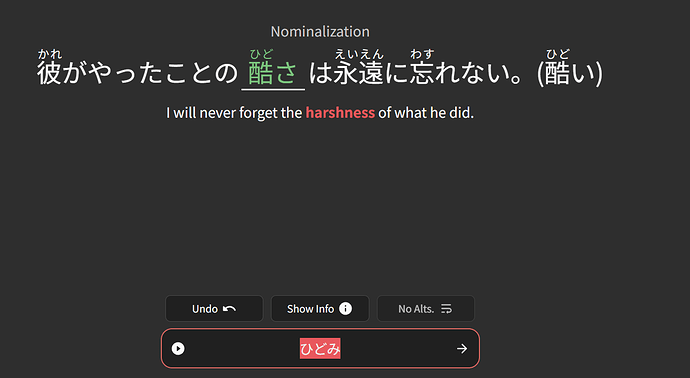Why is sa correct here and mi is wrong? What is the difference?
Hi!
As far as my knowledge goes, the difference boils down to this: さ is ‘objective’ whilst み is ‘subjective’.
Here are the introductory paragraphs of both articles on Tofugu about them (you can read the articles in full by following the links):
-
さ
Adding 〜さ to an adjective turns it into a noun, and gives it the nuance that the noun is objective and measurable. -
み
Adding 〜み to an adjective turns it into a noun with a subjective quality, like the “warmth” of a person or the “weight” of a decision.
In this particular case, one would think that ひどみ would be acceptable as ‘the harshness of what he did’ looks like a subjective appreciation of the speaker. The word doesn’t even appear in Jisho (酷さ does, though), so I guess 酷い might be considered ‘objective and measurable’.
HTH!
This is precisely the case.
Yes, this is what I understood. In the given context, it seemed to me like harshness would be a subjective quality.
さ and み are quite difficult to get a handle on at first. If you will allow me to make a comparison in English, さ is very similar to saying ‘just how’ before a word. For example -
I will never forget ‘just how’ harsh what he did was.
In this case, the ‘just how’ shows us very clearly that an amount is the primary focus. It is not a matter of whether it was harsh or not, it is a matter of the level.
み refers to the innate quality of something where it is possible that various types of that み exist, but no direct comparison is being made to something else. As an example here, I could say that being a person that cries too easily, and being a person that does not cry at all could both be considered someone’s 弱み ‘weakness’. These things are opposites, but I am using the same word to describe them. So when we use み, the み is the focus, and no ‘level’ is being highlighted, all that is being highlighted is that み’s ‘nature’ (usually a personal opinion), but when we use さ, the level of that word itself in regard to something else is the focus.
In general, み is used far less than さ in native material. At least in my reading. If I had to guess why, it would be because Japanese doesn’t tend to lump opinions about the inner nature of something on things. This makes it harder to use み in general, as that is what it sounds like you are doing unless you discuss a widely held opinion about something. This example sentence is the same. Using み about something that is very clearly a personal experience sounds a little bit unnatural.

